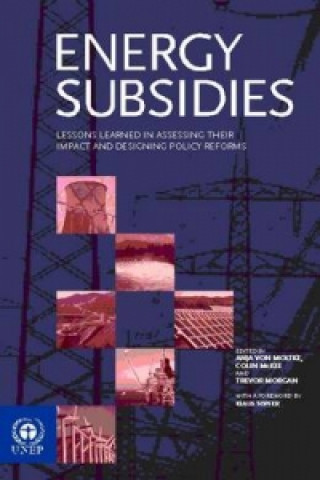
Dostava
Savjetnik za kupnju





Proizvod vam ne odgovara? Nema veze! Možete nam vratiti unutar 30 dana
 Poklon bon
u bilo kojoj vrijednosti
Poklon bon
u bilo kojoj vrijednosti
S poklon bonom ne možete pogriješiti. Za poklon bon primatelj može odabrati bilo što iz naše ponude.
Energy Subsidies
 Engleski
Engleski
 162 b
162 b
30 dana za povrat kupljenih proizvoda
Moglo bi vas zanimati i


The need to reform energy subsidies was one of the pressing issues highlighted at the World Summit on Sustainable Development. Many types of subsidy, especially those that encourage the production and use of fossil fuel, and other non-renewable forms of energy, are harmful to the environment. They can also have high financial and economic costs, and often only bring few benefits to the people for whom they are intended. Removing, reducing or restructuring such energy subsidies is helpful for the environment and the economy at the same time. Potential social costs in terms of employment in the conventional energy industry or reduced access to energy could be addressed by redirecting the money formerly spent on subsidies to income support, health, environment, education or regional development programmes. Of course, subsidies can have certain positive consequences, particularly where they are aimed at encouraging more sustainable energy production and use. Temporary support for renewable energy and energy-efficient technologies to overcome market barriers, and measures to improve poor or rural households' access to modern, commercial forms of energy, for instance, could be positive measures in support of sustainable development. Based on ground-breaking work undertaken by UNEP and the International Energy Agency, this book aims to raise awareness of the actual and potential impacts of energy subsidies and provide guidance to policy-makers on how to design and implement energy-subsidy reforms. It provides methodologies for analysing the impact of subsidies and their reform, and reviews experiences with energy subsidies in a number of countries and regions. Drawing on these case studies, it analyses the lessons learned as well as the policy implications, and provides guidance on how to overcome resistance to reform. The book provides an analytical framework which aims to set the scene for the detailed discussion of energy-subsidy issues at the country level. It considers how subsidies are defined, how they can be measured, how big they are and how their effects can be assessed. A more detailed discussion of methodological approaches to the assessment of the economic, environmental and social effects of subsidies and their reform is contained in the Annex. Chapters 3-11 of the book contain country case studies from contributing authors, which review various experiences and issues related to energy subsidies in selected countries, but do not strive for a common approach. They are organised along geographical lines, beginning with a review of energy subsidies generally in OECD countries. Case studies of energy subsidies in transition economies - the Czech and Slovak Republics (Chapter 4) and Russia (Chapter 5) - follow. Three studies of Asian countries focus on the costs of different types of energy subsidy: electricity subsidies in India (Chapter 6), oil subsidies in Indonesia (Chapter 7) and energy subsidies generally in Korea (Chapter 8). Chapter 9 reviews the effect of energy subsidies in Iran and suggests a pragmatic approach to reforming them. This is followed by an assessment of the LPG subsidy programme in Senegal (Chapter 10) and an analysis of the effects of removing coal and oil subsides in Chile (Chapter 11). Chapter 12 analyses the lessons learned from these case studies, focusing on the economic, environmental and social effects and their implications for policy. Finally, Chapter 13 discusses the implications of these findings and makes practical recommendations for designing and implementing policy reforms. This book will be essential for both practitioners and academics involved in the energy sector and for governments and policy-makers wishing to examine the reform of energy subsidies.
Informacije o knjizi
 Engleski
Engleski
Kategorija




 Kako kupovati
Kako kupovati


























